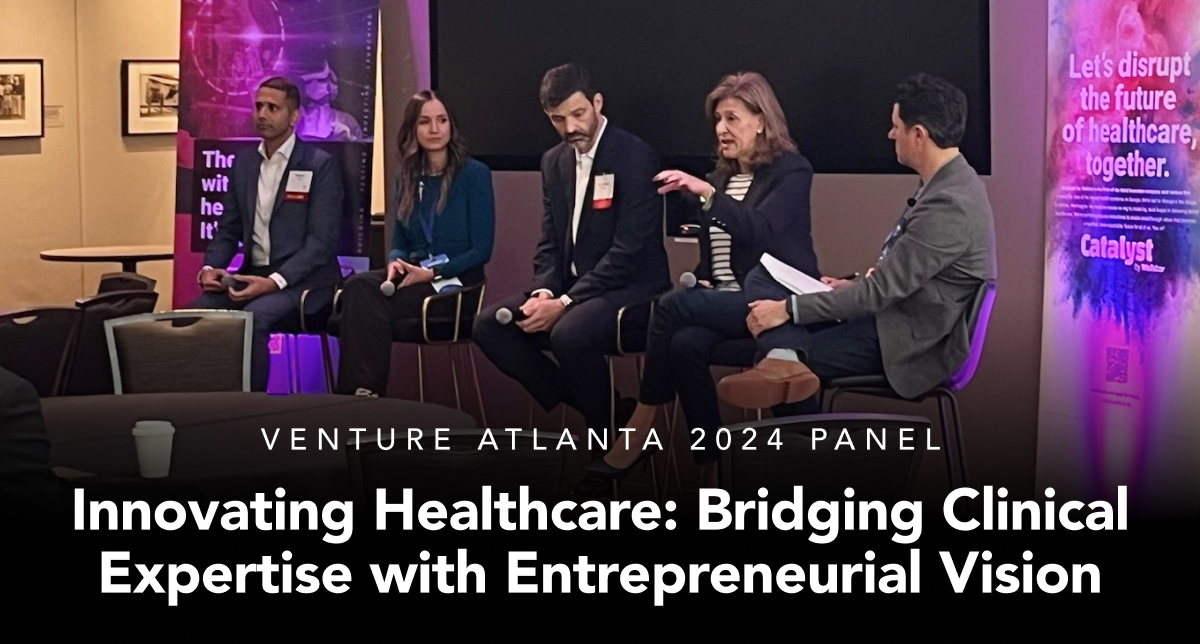It should come as no surprise at this point that healthcare is quickly rising to the top of trending startup industries. At Venture Atlanta 2024, Catalyst by Wellstar kicked off the afternoon of day two with a thought-provoking session titled “Innovating Healthcare: Bridging Clinical Expertise with Entrepreneurial Vision.” Bringing together industry leaders, the discussion explored how healthcare startups, institutions, and venture capital can collaborate to drive transformative change in the healthcare sector.
Moderated by Patric Rayburn, the panel featured Beth Kost (SVP & Chief Compliance Officer, Wellstar), Dr. Daniel Fortes (VP of Thoracic Surgery, Wellstar), Nicole Cook (Founder & CEO of Alvee), and Snehal Doshi (SVP Ancillary and Support Services, Wellstar).
Breaking News: Alvee Joins Catalyst by Wellstar’s Portfolio
One of the standout moments of the session was the announcement that Alvee is now the newest portfolio company of Catalyst by Wellstar, marking an important milestone in Wellstar’s mission to invest in AI-driven healthcare startups.
Nicole Cook, Founder & CEO of Alvee, emphasized the power of AI in improving patient care, particularly in addressing social determinants of health—the non-medical factors that impact over 80% of healthcare outcomes. “AI has the power to uncover hidden challenges and give doctors a superpower to provide holistic care,” Cook said. This strategic investment showcases Catalyst by Wellstar’s commitment to healthcare venture investment, fostering technologies that bridge clinical expertise with innovative solutions.
Navigating Risk in a Traditionally Risk-Averse Industry
With 70% of startups failing, the healthcare startup sector presents unique challenges when it comes to fostering innovation. In healthcare, professionals are trained to “do no harm,” which often leads to a natural aversion to risk. Wellstar mitigates this by hosting think tanks that explore cutting-edge innovations while ensuring patient safety.
Risk-taking in healthcare extends beyond patient safety—it’s also about creating a psychologically safe environment where teams can experiment, collaborate, and challenge the status quo. Doshi emphasized the importance of a culture that supports innovation while maintaining high safety standards. Cook reinforced the need for startups to prioritize regulatory compliance and demonstrate clear ROI. “A great idea isn’t enough,” she said. “You have to prove value in a way that makes business sense for hospitals and providers.”
Bridging the Gap Between Investors and Patient Needs
A recurring theme was the need for investors to better understand the real-world needs of patients to ensure their investments in healthcare startups have a meaningful impact. Dr. Fortes stressed the importance of improving patient access, particularly for individuals with disabilities. “Resistance to change is inevitable, but global accessibility in healthcare must be prioritized,” he noted.
Cook added that social determinants of health are often overlooked by investors, despite playing a critical role in patient outcomes. Alvee is working to surface these hidden challenges, providing healthcare providers with a more comprehensive understanding of patient needs. She emphasized that technology must be used to fill these gaps in care, ensuring that underserved communities receive the support they need.
AI’s Expanding Role in Healthcare
The discussion also delved into the rapidly growing role of AI in healthcare, from predictive analytics to improving patient care. Cook described AI as a tool that enables precision patient care by identifying hidden health risks. She explained that AI-driven insights can help doctors make more informed decisions, ultimately leading to better patient outcomes.
Dr. Fortes expressed concern that while technology is advancing, the human side of medicine is suffering. “Automation should free up time for providers to focus on human connection with their patients,” he said. He emphasized the importance of striking a balance between efficiency and the personal touch that defines quality healthcare.
The Intersection of Business and Healthcare Leadership
As more healthcare professionals earn MBAs and develop business acumen, the panel examined how investors can tap into this dual expertise. Doshi highlighted the importance of partnerships between business leaders and medical professionals to advance patient care. He pointed out that healthcare is a collaborative effort, and diverse expertise is key to solving complex challenges.
Kost reinforced the need to work with regulatory experts who understand the complexities of healthcare compliance. She explained that regulations can often be a barrier to innovation, but those with deep industry knowledge can help navigate these challenges. Cook, a healthcare startup founder and, ironically, the only panelist without an MBA, shared her perspective: “I may not have an MBA, but I know how to build a company that makes an impact.”
Balancing Profitability with a Mission-Driven Approach
For healthcare startups, finding a balance between mission and profitability is crucial to long-term success. Dr. Fortes emphasized that while profitability is essential, patient outcomes must always come first. He noted that a successful healthcare business is one that reinvests profits into improving care and expanding services.
Cook acknowledged that startups must learn how to effectively communicate their mission to investors. “You have to show why your solution is both impactful and financially viable,” she said. She explained that passion and purpose are important, but they must be backed by a solid business model to ensure sustainability.
Q&A: Key Takeaways
The session concluded with an audience Q&A, during which panelists addressed pressing concerns from founders and investors.
Q: What advice would you give investors evaluating healthcare startups?
- Snehal Doshi: Focus on companies that put people first, then profits.
- Beth Kost: Ask this first: How does this solution improve patient care?
- Nicole Cook: Ensure startups understand the regulatory landscape and can clearly prove their impact.
Q: How do hospitals ensure new innovations are adopted by teams?
- Beth Kost: We engage at the ground level to ensure solutions meet real needs.
- Dr. Fortes: Lead by example—adoption happens when leadership demonstrates commitment.
- Snehal Doshi: Find an internal champion—someone who takes ownership of the initiative and drives it forward.
Q: What major changes do you predict in healthcare over the next few years?
- Nicole Cook: Rehumanizing healthcare with AI—using technology to improve, not replace, personal care.
- Dr. Fortes: Restoring the art of medicine, allowing providers to focus on meaningful patient interactions.
- Beth Kost: Accelerating research and innovation timelines through investments like Catalyst by Wellstar.
Final Thoughts: The Future of Healthcare Innovation
This session reinforced the critical role of collaboration in healthcare innovation. As AI, patient care technology, and social determinants of health continue to shape the industry, organizations like Catalyst by Wellstar are helping bridge the gap between clinical expertise and entrepreneurial vision.
Want to explore the latest healthcare startup investment trends? Read our State of Startup Investing Recap to uncover more of the Southeast’s evolving startup landscape.
Wondering what else you may have missed at Venture Atlanta 2024? Check out our full recap of this past year’s conference in our Venture Atlanta 2024 Highlights!
FAQs
How do investors evaluate healthcare startups?
Investors typically evaluate healthcare startups based on market need, regulatory compliance, scalability, and ROI potential. Startups must demonstrate a clear value proposition, a pathway to profitability, and strong leadership with expertise in both healthcare and business.
How can AI improve healthcare outcomes?
AI can enhance healthcare by analyzing vast amounts of data to detect patterns, provide predictive insights, and support decision-making. AI-powered tools help reduce diagnostic errors, personalize treatment plans, and improve operational efficiency, leading to better patient outcomes.
Why do so many healthcare startups fail?
Many healthcare startups fail due to regulatory hurdles, lack of market adoption, high costs of innovation, and difficulties in proving ROI. Without a solid strategy for navigating compliance, securing funding, and demonstrating long-term value, startups struggle to scale successfully.


